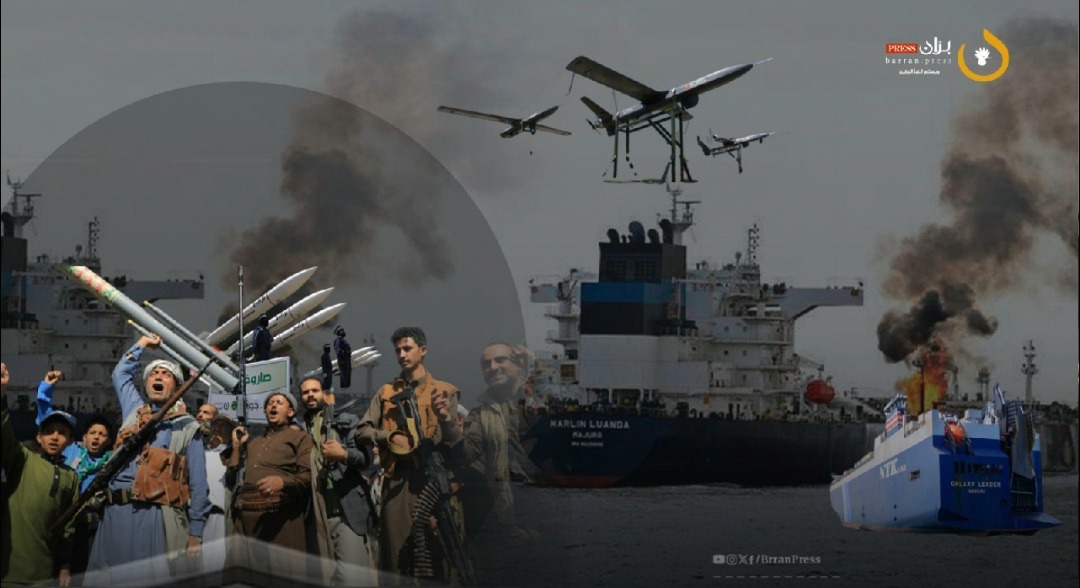
Barran Press - Reuters
On Thursday, October 3, 2024, Reuters reported that the Iran-backed Houthi group, designated as a terrorist organization internationally, has been sending threatening emails to commercial shipowners operating in the Red Sea.
According to the agency, "On a warm spring night in Athens, just before midnight, a senior executive at a Greek shipping company noticed a suspicious email in his inbox."
The message, which was also sent to the company's business email, warned that one of the company’s vessels transiting through the Red Sea is at risk of being attacked by the Houthi militia. The email, reviewed by Reuters, stated that the Greek-managed ship had violated a Houthi-imposed transit ban by docking at an Israeli port, and that the "Yemeni Armed Forces"—referring to the Houthis—"would directly target it in any area they deem appropriate."
The email, signed by the "Humanitarian Operations Coordination Center in Yemen," established in February to coordinate between the Houthis and commercial shipping operators, further stated, "You bear the responsibility and consequences of including the vessel on the banned list."
Since November, the Houthis have launched approximately 100 attacks on ships traversing the Red Sea, resulting in the sinking of two vessels, the seizure of a third, and the deaths of at least four sailors.
The warning message, received at the end of May, threatened "sanctions" on the entirety of the company’s fleet if the vessel continued to "violate the ban criteria and enter the ports of the occupying Israeli entity."
This warning was the first among over a dozen increasingly menacing emails sent to at least six Greek shipping companies since May, amid rising geopolitical tensions in the Middle East, according to six industry sources with direct knowledge of the emails and two with indirect knowledge.
Since last year, the Houthis have been firing missiles, deploying armed drones, and launching explosive-laden boats at commercial ships linked to Israeli, U.S., and UK entities.
Houthi officials declined to confirm whether they had sent the emails or provide any additional comment when contacted by Reuters, stating that such information is classified military data. Reuters was unable to determine whether the emails were also sent to other foreign shipping companies.
Data from Lloyd's List Intelligence indicated that nearly 30% of Houthi attacks up to early September targeted ships owned by Greek companies, which represent one of the largest fleets in the world, without specifying any connections of those ships to Israel.
The email campaign, which has not been previously reported, suggests that the Houthi militants are expanding their scope and targeting Greek merchant vessels with little or no connection to Israel.
In recent months, threats have been directed at entire fleets for the first time, increasing the risks for vessels attempting to cross the Red Sea.
In a separate email sent in June from a Yemeni web domain to the aforementioned company weeks later, and to another unnamed Greek shipping company, it stated, "Your ships breached the decision of the Yemeni Armed Forces; therefore, penalties will be imposed on all vessels of your company."
A document reviewed by Reuters revealed that the European Union’s naval mission in the Red Sea (Aspides) confirmed during a closed-door meeting with shipping companies in early September that Houthi tactics have evolved. Aspides has helped more than 200 ships navigate safely through the Red Sea.
In the document shared with shipping companies, Aspides noted that the Houthis' decision to extend warnings to entire fleets marks the beginning of the "fourth phase" of their military campaign in the Red Sea.
Aspides also urged ship owners to switch off their Automatic Identification System (AIS) transponders, which display a vessel's position and assist nearby ships, stating they must "shut it off or risk being fired upon."
Aspides reported that Houthi missile strikes had a 75% accuracy rate when targeting vessels operating with the AIS tracking system. However, 96% of attacks missed when AIS was turned off.
The Houthi email campaign began in February, directing messages to shipowners, shipping companies, and the main seafarers' union from the Houthi "Humanitarian Operations Coordination Center."
These initial emails, two of which were seen by Reuters, warned the shipping sector of a Houthi-imposed travel ban on certain vessels crossing the Red Sea, although they did not explicitly warn companies of an imminent attack. Subsequent messages sent after May contained more aggressive threats.
At least two Greek-operated shipping companies that received email threats have decided to cease transit through the Red Sea, according to two sources with direct knowledge who requested anonymity for security reasons. A third shipping executive, who also received a message, stated they opted to end business with Israel to allow their vessels to continue using the Red Sea route.
"If safe transit through the Red Sea cannot be guaranteed, companies must act—even if that means delaying their delivery schedules," said Stephen Cotton, General Secretary of the International Transport Workers’ Federation, which received an email from the Houthi coordination center. "The lives of seafarers depend on it."
The email campaign has heightened alarm among shipping companies, with insurance costs for Western shipowners already rising due to Houthi attacks, leading some insurers to suspend coverage altogether.
The Red Sea remains the fastest route for transporting goods to consumers in Europe and Asia.
Despite the threats, the Houthis have not completely halted maritime traffic, and the majority of Chinese and Russian-owned vessels—viewed as having no ties to Israel—can navigate through without hindrance and at lower insurance costs.
In an audio message broadcast to ships in the Red Sea in September, shared with Reuters, the Houthis stated, "We assure ships belonging to companies with no connection to the Israeli enemy that they are safe and have freedom (of movement) and should keep their AIS devices on at all times." They added, "Thank you for your cooperation."





